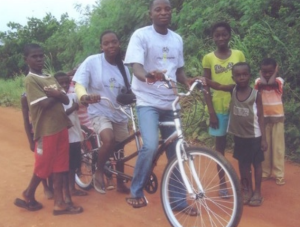by Patricia Hamill
Winter 2012 InGear
While many of our readers have seen some fun and funky bikes being ridden by their happy new owners, we thought it was interesting to include this photo of a model that we don’t often see around our own towns. Well, yes, if you live by the seaside, it may not be such a novelty, but tandem bikes are not the norm for certain. This great ride was collected by Henry Hansen and the Vineland Rotary Club. Judging from the group of kids around it, you can probably bet it’s a fun distraction as well as practical vehicle. And it is without a doubt a very practical and necessary acquisition for the adults you see riding it. The photo gives the impression of a serene and possibly rural road, but these people are posing in a location that is anything but isolated. Oshee is a suburb in Accra, Ghana. This heavily populated and extremely busy area is where this couple resides. Their commute to work at Awoshie, also a suburb in Accra, is about a 6 kilometer journey (3.73 miles).

Adu, a carpenter, and Yaa, a trader, have to wake up early and board a bus that will take them from Oshee to Awoshie daily. To the American consciousness, this seems a simple and short commute; but, for Adu and Yaa, this is a time-consuming ordeal. They face competition for the overcrowded buses that then must navigate congested roads filled with the surging waves of workers heading in the same direction. The stress resumes for the return home. Riders have to line up and often wait several hours before a bus arrives with available seats or reasonable standing room. Time spent on line and in traffic is taken away from other more productive endeavors.
Now, with the help from P4P’s partner in Ghana, WEBike, the problem is solved. Adu and Yaa no longer need to wake up at dawn to join the bus or line up at night. The tandem bike that they now own can glide them quickly by the stalled lanes of traffic and into Awoshie and change an interminable and expensive four-mile journey into a managable endeavor on their schedule. An added bonus is that the money they save on the bus commute can be used for other necessities.
The benefits of this option for travel extend beyond the advantages to Adu and Yaa. Two fewer people are dependent on fossil fuels and are not contributing to heavy pollution in the area. Two may be a small number, but as many more people gain access to reliable, cheap, and quick modes of travel, there can only be a benefit to the larger population and environment. If they can effect that change while cruising on a rather unusual set of wheels, even better.
